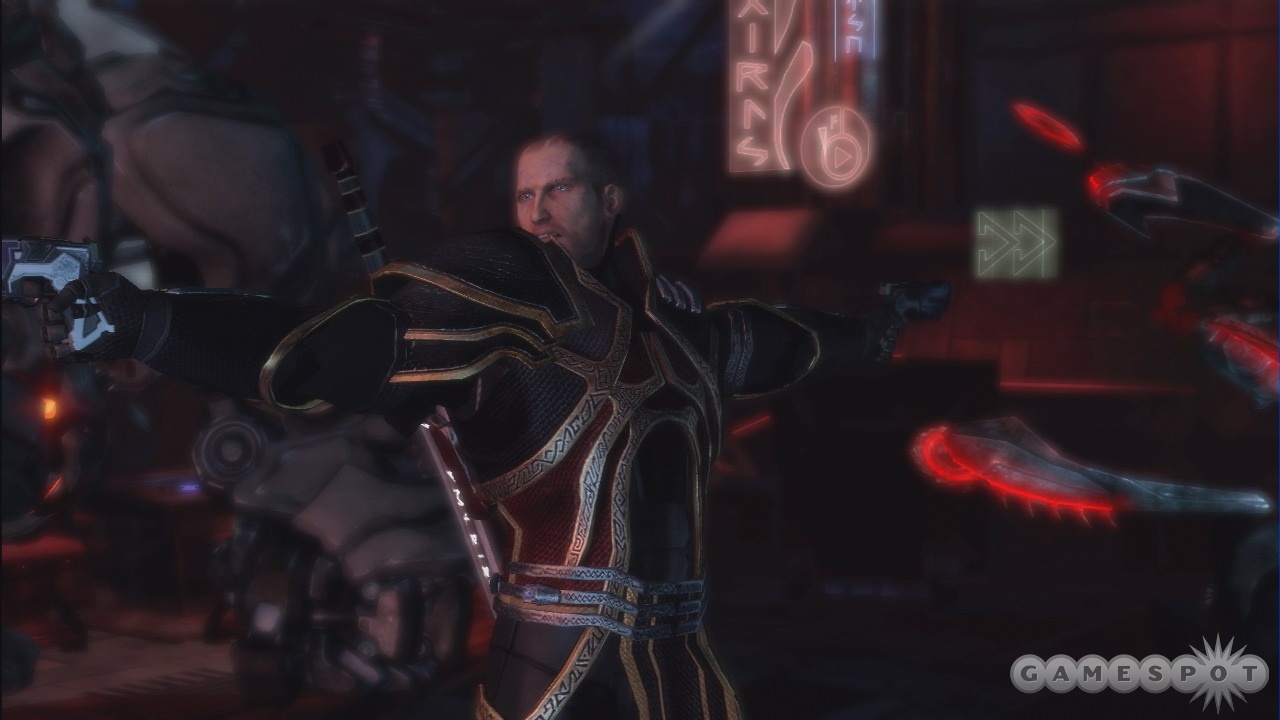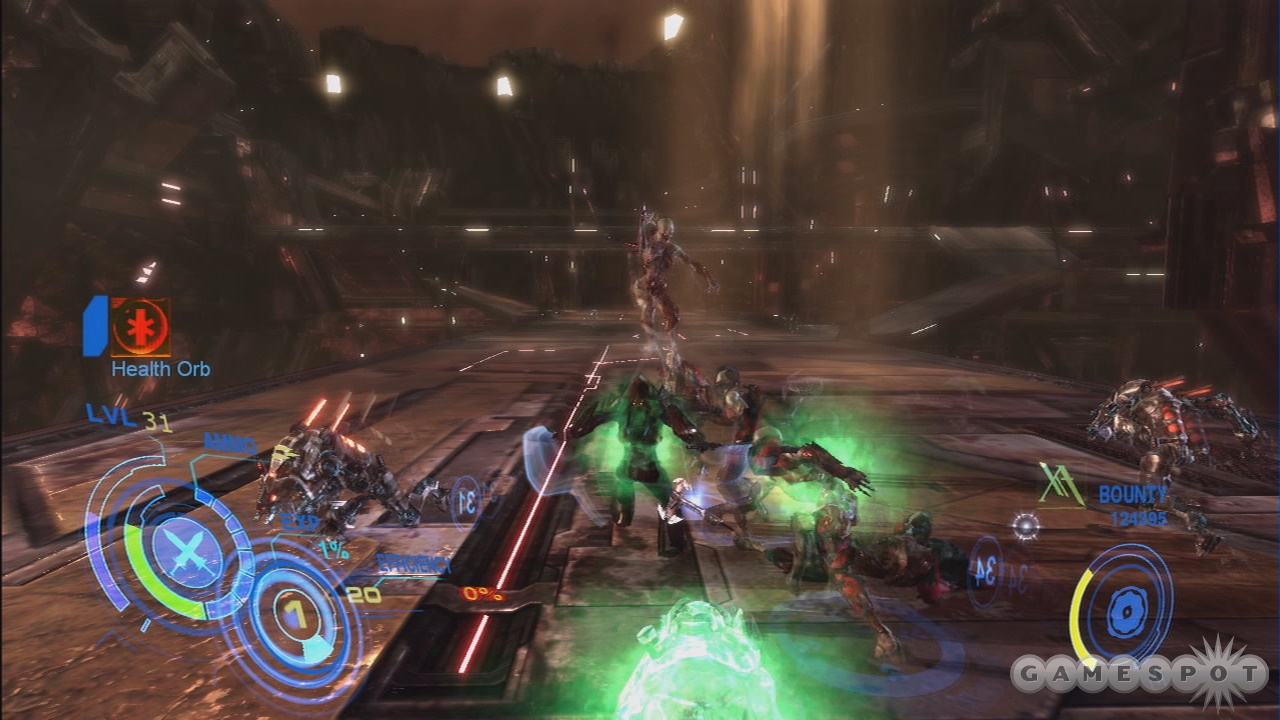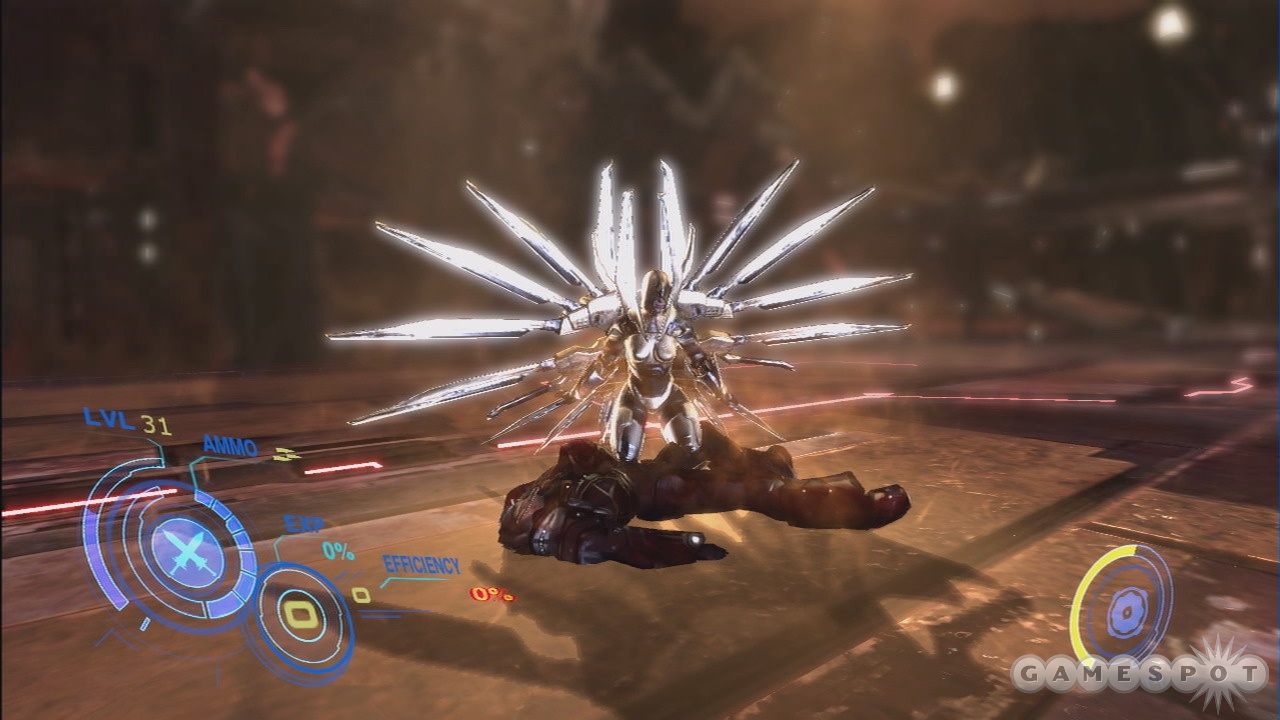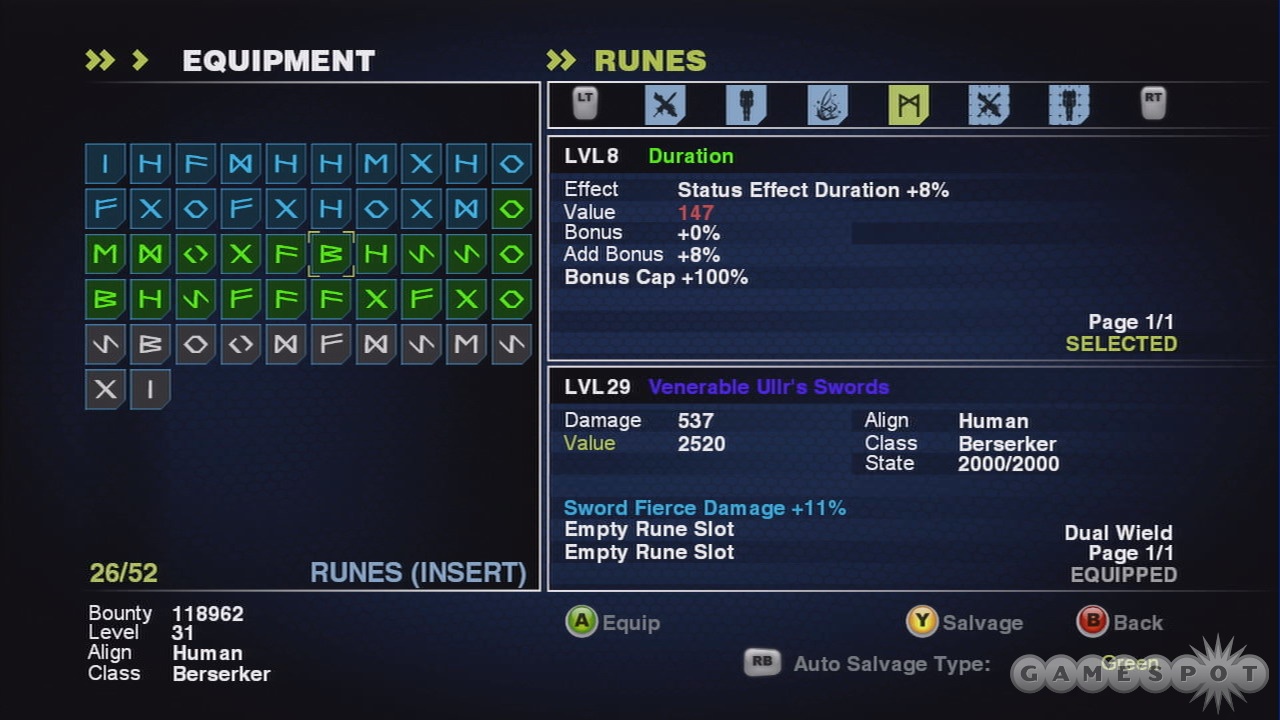Too Human drops a juicy plot development at the most inopportune time: its very end. It's the obvious manner of setting up a sequel, the infamous "to be continued..." we've come to expect from television shows and, yes, even some modern video games. This isn't necessarily a bad thing, but it exemplifies the core experience of this action/role-playing hybrid. Too Human is a game of false starts and unrealized potential that infiltrate almost every aspect of the game, from story, to combat, to balance. Its elements feel stitched together, making for a patchwork quilt of a game that's fraying at the seams.

As for the dangling story threads, the disappointment is compounded by the thin narrative that leads to them. Too Human is a retelling of Norse mythology with a cybernetic twist, in which the gods are bionically enhanced humans protecting common men and women from the onslaught of Loki's army of machines. There's some backstory to wrap your head around, and Too Human drops you into the world with little sensible exposition. A good narrative doesn't need to spoon-feed plot points to you, but Too Human would have benefited from a better introduction to its unusual universe. The game does offer a few meaty moments, many of them involving Hel, Loki's beautifully twisted daughter. Yet ultimately the story rings hollow because developer Silicon Knights expects you to fill in the gaps on your own.
You play as Baldur, one of those gods. You'll take on four main missions during the meager 10-hour story and while Baldur has a number of different goals, the process is the same: beat up a bunch of mechanical monstrosities en route to an end boss. The trek is linear, taking you through a series of large environments that cover the usual science-fiction standards. You'll also spend some time in Aesir, your home base, where you're able to purchase weapons and armor, and continue the story between combat sorties. These areas have a commonality: They are too big. This isn't an issue when you are beating up hordes of robotic beasts, but when you aren't fighting, Too Human slows to an insufferable crawl. Aesir in particular is unnecessarily vast and underpopulated. As you make the long, boring walk to find out your next mission, or move to the next wave of monsters, it's hard not to wonder if there was supposed to be more stuff there. It's one of many examples of Too Human's most glaring deficiency: poor pacing.
You'll also make a few trips to an idyllic world known as cyberspace, which you access via glistening pools scattered around the levels. As you explore cyberspace, you will learn new abilities that you can only use there, such as being able to telepathically lift doors or set vegetation ablaze. You unlock new areas in the main world when you visit cyberspace, and you find some interesting loot, but these visits don't flow from the gameplay proper, and they slow things down too much. And, like the rest of the areas that you visit, this pastoral realm feels too large, particularly because you're not really doing anything there except walking and occasionally pressing a button. It's not engaging and ultimately feels unnecessary.
The good news is that when you are in the thick of combat, you'll find yourself having some fun. There are five different classes at your disposal, but regardless of which you choose at the outset, you can use both melee and ranged weapons. Close combat is where the game shines, and in those moments it plays like an action game with a control-focused twist. Rather than mashing buttons to swing your dual swords or bash your hammer, you press the right analog stick in a certain direction and connect with the closest enemy in that area. Provided that you're within range of a target, you will actually slide in that direction; at later levels, zooming among techno-goblins and slicing them up in this manner is easily Too Human's greatest thrill. There are also some other stick-based tricks at your disposal: Using the left and right analog sticks in combination, you can toss enemies into the air and juggle them, or fling magic energy in their direction.

The resulting mayhem looks more like an action game in the vein of Devil May Cry or Ninja Gaiden, though it doesn't really play that way. Nevertheless, it works well some of the time, and Baldur will slip and slide around as you hold and tap the sticks, carving up lesser enemies without much effort. At other times, you'll swing at nothing in particular, though it seems that you're aiming the stick in the right direction and that the enemy is clearly in range. Although it isn't the heart-pounding array of button-based combos that you'd see in a more traditional action game, you'll still sometimes find morsels of that smooth groove so important to action RPGs.
Unfortunately, Too Human never maintains that groove for long. You have guns to shoot--pistols and rifles--but using them isn't as satisfying as using melee weapons, even if you are playing as a commando, the primary ranged-based class. They can be fun when used in conjunction with melee attacks, such as juggling a foe from a distance after launching him into the air with your staff. But the targeting system is unintuitive and sometimes broken, failing to lock on to an enemy even if there are monsters in range and directly in front of you. Should you try to switch targets, you may target an enemy outside your field of view, or find yourself shooting at nothing at all. Oddly, if you keep the trigger pressed after you've killed your target, the reticle stays pasted to the corpse instead of flipping to another target, so you need to switch targets manually, even after your victim has already fallen.
Other issues make the combat even more frustrating. Eventually, your foes will pummel you with knockback attacks and various status effects, such as freezing you, slowing your movement to a crawl, or irradiating you. These attacks are poorly implemented and point to Too Human's balance problems: They last far too long and slow the tempo far too much. For example, if you get irradiated, you will take damage over time that could very well take you from full health to death. Unless you are playing as a bioengineer, a class that has healing capabilities, you must rely on finding health drops from enemies or from breakable containers, given that there are no potions or similar items. But getting such a drop is a crapshoot, particularly if you have just finished an enemy encounter and have another uneventful walk for the next 30 seconds until you find the next batch of baddies. As a result, you will watch powerlessly as Baldur dies multiple times due to the reckless implementation of these mechanics.

So death is inevitable, but Too Human's greatest oddity is its method of punishing you. There's a minor in-game consequence: Your weapons take some damage, which makes them less effective, and you get deposited at the most recent checkpoint. However, all damage that you previously did to your enemies will remain, so you are just starting from where you left off. Yet the real punishment is aimed at your convenience. Every time you die, you will be forced to watch a Valkyrie slowly descend, take Baldur into her arms, and lift him toward Valhalla. It's a beautiful animation, and the stunning, glowing Valkyrie is one of the most wonderfully crafted character models that you're likely to see in a while. But the quality of the vision is of little consequence considering that it lasts seemingly forever, and you cannot skip it. It is impossible to imagine how a development team could have thought this forced death sequence was a good idea--and depending on which class you choose, you could be seeing it rather often. It's one more example of the game's stilted, awkward pace.
Some of these issues are mitigated by adding a buddy to the mix. Assuming that both players are around the same level, online co-op increases the fun factor of Too Human's bright moments. When you both face an onslaught of weaker foes, the resulting chaos is enjoyable, perhaps even a thrill at its best. However, Too Human's inconsistent balancing and pace mean that double the players can sometimes mean double the frustration. When the game throws in a sequence of ground-pounding, grenade-launching, irradiating foes, the flow is ruined and the Valkyries will soon be making their sluggish rounds. This issue is exacerbated when players aren't of the same level; the higher-level player may face legions of enemies that feel designed to challenge two players at that level, whereas the lower-level player will be essentially powerless to assist. There are other oddities here as well, such as the game's random-name generation. In general, it's fun to see what cool, over-the-top title Too Human will assign to its named enemies. How strange, then, that a different name will be assigned to the same monster for each player. It's a small quirk, but one that, when you discover it, seems like yet another sloppy oversight in a game that sorely needs some fine-tuning.
Though the combat itself can't consistently deliver the smooth, addictive action that you'd want from a good fighting system, the RPG side of the coin is sometimes excellent. Probably the finest aspect is the constant flow of helpful loot in the forms of weapons, armor and other goodies. There are a ton of interesting weapons to equip and armor sets to try on, and once you reach the upper levels, these items look incredibly impressive and make Baldur truly look like a god among men. You can also find and purchase blueprints to craft armor of your own, and purchase runes that let you dye your items to match.
You can further develop your weapons and armor by applying enhancement runes to them. These also flow into your inventory in a constant stream, and you can apply multiple runes to your items, depending on how many slots they have. Not every rune is helpful to every class (regeneration runes are no help to a berserker), but you'll soon have a healthy supply of useful enhancements at your disposal. There's also the matter of class-specific skills and augmentations, which you develop at first under your main skill tree, and then further tweak using a secondary tree that you later unlock. Every class has a command called a battle cry, and depending on the skill tree that you choose, that skill may produce flashes of lightning or increase your attack speed. You can also summon a spiderbot to your side, and depending on the direction that you take, your bot may deploy a turret that slows monsters down, or bomb nearby baddies, among other options.

The game's visual bright spots--the highly detailed Valkyrie models and the powerful-looking weapons--are worth calling out again, particularly because they are highlights in a game that is decent-looking but not particularly noteworthy. Some of the environments feature excellent detail and lighting, with towering statues lording over the proceedings and shafts of light spilling onto mounds of snow. But don't expect to leave footprints in that snow, or see any other touches that will make you sit up and take notice. Eventually, each setting seems much like the last, and the stiff combat and facial animations become more and more noticeable. The sound design follows a similar path. The musical score is excellent and dramatic, though some musical loops are awkward because the end of the sample doesn't jive with the beginning of the next. Most of the sound effects are appropriately rambunctious, and though the voice acting is hit-or-miss, Crispin Freeman, as Baldur, delivers just the right mix of gruffness and vulnerability. However, one oddity that sticks out is the overwrought sound effect assigned to Baldur's jumps: The robotic whoosh when he leaps and the crash when he lands both feel out of place.
There are further idiosyncrasies to note, including awkward camera angles and the occasional glitch (for example, doors that won't open when you approach them, but open if you leave and return). These and other issues don't make Too Human a bad game, but they make it a disappointing one that revs its engine only to come to a screeching halt moments later. When that engine kicks into full gear, the slicing and dicing can be surprisingly enjoyable. Sadly, these moments are too few and far between, making Too Human stand out as a perfect example of awesome but unrealized potential.



